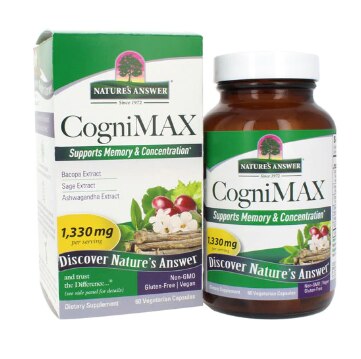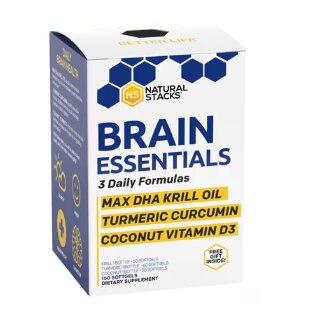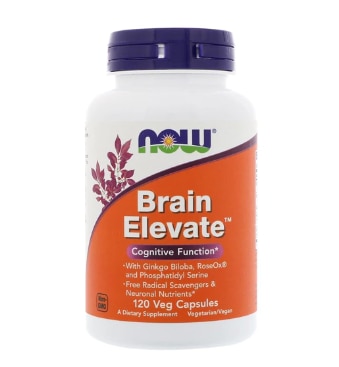Neurodegenerative illnesses like Alzheimer’s disease once existed on the periphery of cultural conversations as supposedly rare conditions that occurred to distant, elderly relatives.
Now, however? Age-related cognitive decline, ALS and Lou Gehrig’s disease are increasingly discussed—so much so “how can I improve my brain health?” has become one of the most often-asked questions of Google.
Why the shift, you might ask?
Good question. It’s fueled by three primary changes:
1) we’re living longer as a species and diseases like Alzheimer’s are rapidly growing in number, with approximately 10 million new cases of dementia emerging around the world annually (or every 3.2 seconds);
2) cognitive health (and attempts to ward off dementia) have officially become mainstream as wellness trends of all stripes continue to expand, and
3) advances in medicine and research have rendered longevity of the mind more and more accessible to many.
With this, a slew of hot topics surrounding brain health have surged. Some recommendations are promising (here’s looking at you, nootropics), others are purely speculative in nature, and others still are downright hazardous.
But if there’s one emerging brain health buzzword you should be paying attention to, it’s plasmalogens—a phospholipid that’s been implicated as a potential marker and a therapeutic possibility for neurodegenerative illnesses.
Here’s what to know about this miniscule but fascinating lipid—and the steps you can take to shield your cognitive soundness naturally.
What are plasmalogens?
Plasmalogens are membersof the phospholipid family—a class of lipids, or fats, that are a fundamental part of cell membranes, making up an estimated 18 to 20% of phospholipids in cells. Found in the retina, heart, skeletal muscles, immune system and brain, plasmalogens serve an essential role specifically in neuron cells, or cells that are vital for cognition, by operating as a self-made antioxidant against oxidative stress.
Why are neurons important?
Let’s back up here for just a moment so that you can get a clearer picture.
Your ability to think, move, speak, breathe, eat and emote is governed by your central nervous system, which includes your spine and brain. Two chief types of cells make up these regions: Neurons, which act as messengers of information, and glia, which support and structure your brain by protecting neurons.
These neurons are perpetually at work, submitting hormones and chemicals (or neurotransmitters) across a small byway called a synapse. They allow different regions of the brain to communicate with each other and the rest of the body.
In the absence of neurodegeneration, neurons converse at ease, enabling you to calculate numbers, recall how to speak Spanish, memorize a new dance routine and more. But neurons are also prone to death during what’s known as migration and differentiation, just as they’re vulnerable to taking bizarre twists. As a result, a neurodegenerative disease may ensue, such as:
Huntington’s disease, in which neurons over-generate glutamate (an essential neurotransmitter). This destroys neural cells stationed in the basal ganglia—a pocket of the brain that presides over motor control. Uncontrollable physical movements, difficulty walking, struggling with eating—all are a direct repercussion of this destruction.
Alzheimer’s disease, wherein abnormal proteins accumulate around and in the hippocampus and neocortex—two imperative components of the brain that regulate memory. As these neurons die off, the capacity to perform quotidian tasks declines right alongside recall.
Parkinson’s disease, in which neurons that are needed to produce the neurotransmitter dopamine perish, again in the basal ganglia. This damage to motor control subsequently leads to balance issues and shaking, as well as a slowness to movements.
At times, such as with age-related cognitive decline, neuron deaths are a natural aspect of, well, being human. At other times, accidents (such as falls) can cause spinal cord injuries that cut off the communication between neurons, while strokes may trigger the immediate death of neurons or gradually kill them by depriving them of the nutrients and oxygen they need to survive.
How do plasmalogens impact brain health?
These ever-important neurons are surrounded and shielded by plasmalogen-containing cell membranes. Given their unique structure (for the science-inclined out there, they boast a vinyl-ether bond at the sn-1 position), these phospholipids influence plenty, namely by:
- Fostering synaptic communication between neurons
- Maintaining cell membrane integrity
- Offering neuroprotective properties
- Modulating inflammation
- Nurturing overall brain health
We’re only now beginning to unlock the powers of plasmalogens and the hand they have in neurodegeneration, but new research reveals that patients with Alzheimer’s disease have lower plasmalogen levels than their healthier counterparts. (Whether this is the consequence of neurodegeneration or the cause remains unclear.) Further, waning plasmalogen levels may also exacerbate the symptoms of Alzheimer’s.
What does this indicate? It means that discovering low plasmalogen levels may result in early detection of Alzheimer’s, even prior to the onset of symptoms, and might compel people to act sooner. Moreover, and most promising in the field of plasmalogens, replacing them may have the potential to nourish cognitive wellness.
But can you replenish plasmalogen levels?
Studies indicate that certain foods can influence lipid composition in cells. These include:
- Seafood, such as salmon and Amberjack
- Meat, particularly beef, chicken, pork and lamb
- Mollusks, specifically shrimp, scallops and clams
That said, you might have to consume a nearly untenable amount of these eats to see a significant difference.
A smarter solution? Prioritizing activities and lifestyle changes that promote brain health while paying attention to further research on plasmalogens and how they might be utilized in the future to halt mental deterioration.
How can you naturally encourage cognitive wellness?
Scientists once believed that we’re given a select number of neurons at birth, but a mounting body of evidence suggests that we’re continually able to experience neurogenesis as we age.
In other words? We have more control over inducing neurogenesis, and maintaining our intellects, than once thought. A handful of the most effective ways to do so boil down to:
Amping up aerobic exercise
Aerobic exercise supports brain health in three predominant ways: it prompts new neural cell growth, bolsters the production of brain-derived neurotrophic factor (BDNF), which supports nerve health and enhances mood—and with a brighter, more resilient frame of mind, you’re practically bound to make wiser, more wholesome decisions that may ultimately advance cognitive health.
Adhering to the Mediterranean diet
The Mediterranean diet has been dominating wellness news in recent years, and for a good reason. The basics of the diet—fresh fruits and vegetables, fish, olive oil and nuts—are among the best eats you can feed your brain, with studies showing that the meal plan is linked to enriched memory and a decreased risk of cognitive decline. What’s more, the Mediterranean diet, which brims with delicious choices, encourages a balanced and robust gut microbiome and may facilitate brain health though the gut-brain axis.
Curbing your intake of purines
Research indicates that elevated uric acid levels may be associated with dementia. While you may not be able to evaluate nutrition labels for where a food stands on the uric acid scale, you can limit your consumption of purine-rich foods, which stimulates the production of the acid. These include alcohol (especially beer), red meat, organ meats and tuna.
Sustaining healthy cholesterol levels
Some research points to a correlation between high cholesterol and decreased plasmalogen levels. With this in mind, aim to keep your cholesterol levels in check by snacking on flax and chia seeds (which naturally reduce triglycerides), filling your plate with healthy fats (like avocados), and embracing ample physical exercise.
Paying attention to your hearing
Our hearing may naturally diminish as we age, but hearing loss may be an early predictor of cognitive impairment.Be mindful of loud noise (and music!), regularly have your hearing examined, and, if it’s called for, heed your physician’s advice and wear a hearing aid: It may slow mental decline.
Keeping your mind active
If you’ve ever listened to an octogenarian talk about how they keep their mental faculties vibrant, chances are high they’ll list a host of hobbies that effectively engage their brain. Knitting, crossword puzzles, chess, Spelling Bee, Wordle, Scrabble, reading, gardening—all are superb ways to exercise your mind, which, in the end, is just as important as exercising your body. Additionally, challenging yourself to learn a new skill may spur neurogenesis.
Maintaining your social life
Study after study demonstrates that nurturing your friendships organically augments happiness, decreases stress (which may heighten inflammation) and even alleviates the symptoms of dementia. Plus, wellness-minded friends can keep you apprised of the latest health news—including novel research on the role of plasmalogens in well-being—and remind you why you’re alive: To love and be loved in return.
†These statements have not been approved by the Food and Drug Administration. These products are not intended to diagnose, treat, cure or prevent disease.




